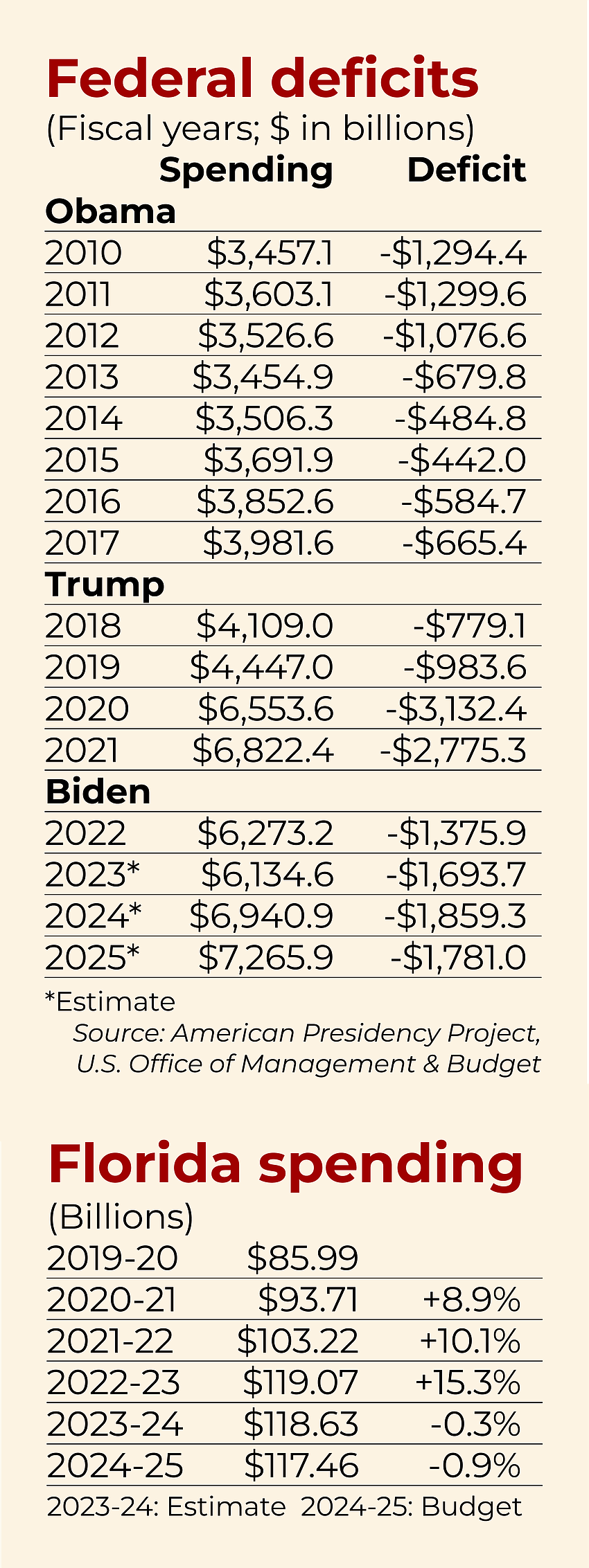- April 27, 2024
-
-
Loading

Loading
What a contrast — the Biden proposed budget and the historical federal deficits versus the Florida budget for 2024-2025.
It’s pretty evident when you look at the annual federal deficits over the past 16 years, that all our fiscal and political dumbledorks in Washington live in complete moronic fantasia.
While state governments typically are constitutionally required to adopt annual balanced budgets, there are simply no bounds or restraints on the way they abuse our money in Washington — proving over and over that the rules that apply to us do not apply to them.
In 10 years, from 2014 to 2024, federal spending has increased from $3.5 trillion to $6.9 trillion — a 97.9% increase, essentially doubling in that time!
How many of you have managed to double your annual income and spending in that time?
And worse, the federal deficits in that time skyrocketed from $484 billion to $3.1 trillion under Trump (the COVID spending spree) down to a measly $1.8 trillion estimated for the current fiscal year.
A deficit of $1.8 trillion?
And by the way, when you look at the spending and deficits during the Trump and Biden years, they: 1. Make Barack Obama look like the fiscal conservative of the bunch; and 2. Reveal that Donald Trump isn’t a fiscal conservative by any imagination.
In the latest Biden budget submission, the bumbledorks do the usual Washington fiscal fiction. They make the magnanimous, totally fantastical claim that their spending plan will cut the deficit by $3 trillion over 10 years!
Hahaha, hahaha, hahaha.
Really? How many of you create 10-year family budgets? There is not a sane soul in the America who believes for a second that Washington will cut real spending a dime or reduce the deficit that much over 10 years, much less in one year.
You have to admit, it’s beyond mindboggling why Americans do not insist that our federal government must do what we and all states must do: balance our annual budgets.
Now, contrast the fiscal disaster in Washington with a far saner approach (although not perfect) in Florida. Florida’s state constitution, of course, requires a balanced budget. And while lawmakers achieve that every spring, Floridians have had the good fortune of having Republican governors and legislators the past 20 years who rarely dare to increase taxes.
Indeed, they haven’t needed to do that. Florida’s state budget consistently benefits from two driving factors: Population growth and Florida’s ability to continue to attract growing numbers of tourists. Together, they generate billions of dollars in consumer spending, which in turn translates to sales tax receipts and property taxes that provide plenty of cash to our state and local governments.
While state spending has increased 36% since fiscal 2019-2020, in the past two legislative sessions, including the one completed last week, the Legislature actually has reduced state spending from the previous — a feat you will never see in Washington.

You can see in the accompanying table how state cash mushroomed in fiscal 2023, thanks to the federal COVID emergency cash, and has since come down slightly since.
Also in contrast to Washington, while the state is cutting spending in the current and next fiscal years, in each of those years and the previous six years, the Legislature also budgeted sales tax holidays saving Floridians about $1 billion each year, while at the same time increasing spending for public education.
Moral of the story: A balanced budget and fiscal sanity can be achieved.
Sidenote: Our state and federal governments are absolutely lousy at making it easy for taxpayers to find online easy-to-understand budget documents. It’s always an Alice-in-Wonderland hunt down online rabbit holes.
What’s more, if you want a simple snapshot in the form of a standard revenues and expenses statement showing a year-over-year comparison, forget it. They don’t exist.
Given the difficulty of finding the details of how our money is spent, you have to conclude lawmakers and bureaucrats make it so difficult for an obvious reason — so taxpayers don’t really know where their money goes, other than down a black hole.